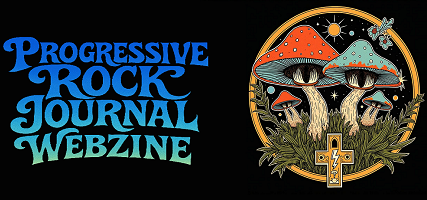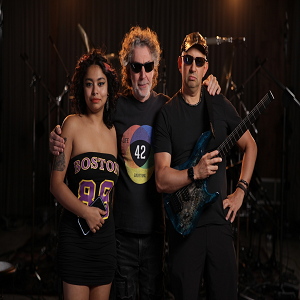Prog-Rock supergroup DarWin returns with their highly anticipated new studio album “Distorted Mirror,” set for release on September 26th, 2025 via OoS/Phantom Recordings. Following the critically acclaimed “Five Steps on the Sun,” the band continues its unique sonic journey with eight brand new tracks packed with intricate melodies, dynamic grooves, and unparalleled musicianship. Featuring an all-star lineup including Simon Phillips, Matt Bissonette, Greg Howe, Mohini Dey, and Derek Sherinian, “Distorted Mirror” promises to be an essential listen for any Progressive Rock enthusiast. We had the pleasure of delving deeper into the creative process, musical craftsmanship, and artistic vision behind this powerful new release.
The album title “Distorted Mirror” suggests a reflective yet altered perspective on reality. How does this concept manifest throughout the eight-track journey, and what specific elements in your compositional approach mirror this distortion theme?
DW: Thanks for your questions. We like to ask big questions in our music, and the point in asking big questions is that we want to create a safe space for the listener to ask big questions. Music can be a great catalyst for thought and spirituality. Asking big questions is different than trying to tell others how to think. That’s more like brainwashing. We want to encourage people to feel safe to ask questions about their world, bigger trends happening around them, their unique role in this point in history, and through this, aspire to grow and learn. This fundamental philosophy is quite important to the writing process. By making original songs and sharing it, the audience has an opportunity to learn something new musically through the songs, maybe a new groove or way of combining keys, etc, but it shouldn’t feel like work. It’s more like when you play a game you might be doing some math in your head but you would never realise it consciously—you are just having fun.
“Rising Distortion” opens the album as a spectacular instrumental depicting the sonic rise of superintelligence. Can you walk us through the musical architecture of this piece and how you translated such an abstract concept into tangible Progressive Rock language?
DW: This was the final song that DW wrote after we had finished our official sessions in the studio. Now that we had all of the songs in place, it felt like there needed to be an opening, an introduction. The pattern had to be like breath. It had to breathe and build. We needed to witness a beautiful creation of intelligent life. Cognition and intelligence are beautiful. But then this new intelligence grows and grows and grows, and becomes something much more, and then we arrive at Distorted Mirror.
Following the success of “Five Steps on the Sun,” how did you approach “Distorted Mirror” to ensure it picks up exactly where the previous album left off while pushing your creative boundaries even further?
DW: The albums were written both side to side or back to back. Some songs on Distorted Mirror were actually written before the Five Steps on the Sun songs. They are part of the same flow of writing and production. But we grouped the music into different albums. We added more songs and grouped earlier songs that were more for this album’s theme and the necessary balance of the experience. We still think in terms of listening to an album for 45 minutes as a singular experience.
The circular acoustic guitar patterns in “Loophole” underscore the notion of “history repeating itself.” How did you craft these musical cycles to serve both the song’s narrative and its emotional impact?
DW: That’s a good way of putting it.
Greg Howe‘s extended jam at the end of “Winter Face” reportedly showcases some of his most flavorful solo work to date. What creative environment did you establish to allow such spontaneous yet structured musical exploration?
DW: It’s a really great solo. Everyone should check it out. It has a fantastic jam led by Simon and Mohini, with J3PO on keys. When DW spoke to Greg about ideas for the solo, DW encouraged him to just play through it right to the end full bore, 100%, like a sprinter who sprints through a finish line and is still running fast past the finish line. And DW
suggested that he think about it a bit like a horn or sax player—avoid the tendency to want to go to typical habitual patterns or licks, and really just keep expressing meaningfully with all of his might. It’s going to be long and exhausting. But the idea was that we’re showing at the end of the album that we’ve got a lot of fire, a lot of the gas in the tank, that even at the end of the album, this group is still jamming and won’t quit, and there’s a real energy to the playing, very much a live feel.
With virtuosos like Derek Sherinian on keyboards and Mohini Dey on bass, how do you balance individual technical brilliance with the collective Progressive Rock vision of DarWin?
DW: Everyone is super talented, but at the end of the day, we want to make really nice songs that feel great and anyone can listen to and appreciate. You don’t have to be a prog head and be able to count 5/4 to dig the music. We want to make songs that everyone can love and an album experience that anyone can appreciate. The musicianship is great because actually folks bring so much knowledge and range to the choices they make to help a song sound more interesting. The creativity encourages others to be creative. And sometimes its just a simple idea or note that kind of takes everyone in a different direction or really completes the sound of a song. So the song comes first and even the solos should really be an expression of the heart of the song, not too much about technical wizardry, although there is some of that too.
Simon Phillips brings decades of experience from working with legends like Jeff Beck, The Who, and Toto. How does his rhythmic foundation influence the overall architectural approach to these complex compositions?
DW: Simon is co-producer and co-writer with DW in DarWin (Matt Bissonette is also a co-writer). This is our project together from the beginning. Simon impacts all aspects of the songs at all times. We constantly are shaping everything together as a team, and we have different ideas and approaches which leads to interesting creative twists.
Matt Bissonette‘s vocals are described as “majestic and magical.” How do you craft vocal arrangements that complement the intricate instrumental passages while maintaining the emotional core of each song?
DW: Matt Bissonette has been driving the writing the lyrics since Five Steps on the Sun. We’ve been working together for 10 years now and we share a vision regarding what the DarWin sound is all about. We love harmonies and melodies and vocals that make you feel at peace, even when the instruments might be cooking along more aggressively.“
The album concludes with the promise that “the fun is just getting started” and DarWin “still has plenty of gas in the tank.” What unexplored musical territories are you most excited to venture into next?
DW: We’ve been working on the next album, hopefully due in 2026, for over 1 year now. This is also a very ambitious album, and quite different from the others. So we’ve been continuously at work for a number of years now. We love to produce memorable songs and albums. We hope you enjoy Distorted Mirror and stay tuned for more information on
releases!
Thank you for the interview!
With “Distorted Mirror,” DarWin not only expands their unique sonic universe but once again challenges the boundaries of Progressive Rock itself. An album that seamlessly combines intellectual depth, virtuosic
performances, and emotionally charged storytelling, “Distorted Mirror” positions DarWin at the forefront of modern Progressive Music. As the band hints at even more musical adventures on the horizon, it’s safe to say
the journey is far from over — and we’re eager to hear where they’ll take us next.
Pre-Order the new album here: https://darwin.tmstor.es/


[…] Read our Exclusive interview with DarWin here: https://progrockjournal.com/interview-exclusive-interview-with-prog-rock-supergroup-darwin/ […]